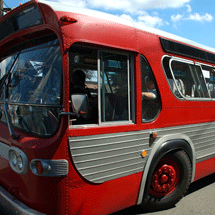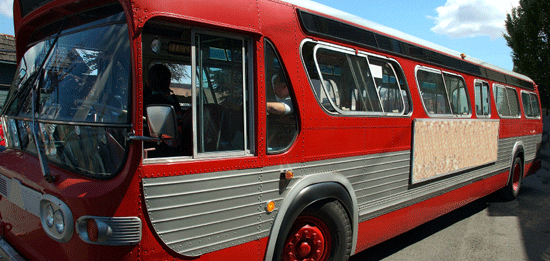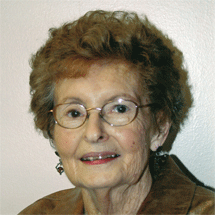 |
never say never!
by Bill and Brenda Evans
Find out more about the Free Will Baptist Foundation at www.fwbgifts.org.
|
ALONE, WITH ONLY A SMALL WAD OF MONEY tucked into her right sock, June boarded a bus in Dearborn, Michigan headed to Paducah, Kentucky. It was a 425-mile trip. The year was 1940. June was 10 years old. Headstrong and independent, she felt insulted when her mother asked a female passenger to watch out for her. “I didn’t need anybody to do that. I knew I could do it alone,” she said.
On Her Own
Though just a pint-sized child, June was self-reliant. Her father died when she was four and a half, and she remembers telling her mother, “I won’t cry if you won’t.” For years after his death, she and her mother shuttled back and forth between West Tennessee and Michigan to live with various family members, never having a home of their own. At times, June lived in one state and her mother in another.
“I ended up being on my own a lot in my life. But those experiences were good training,” June says. In some ways, that first long, lonely bus ride presaged three important aspects of June Trimble’s adult life: a can-do attitude, a love of travel, and the smart handling of money.

Even as a child, June thought she could do whatever she really wanted to do. Saved at eight, she thrived at school and worked hard at her grandparents in Woodland Mills, Tennessee. Her first job as a teenager was cleaning and sewing for $5 a week. After graduating high school as valedictorian in 1948, she moved 200 miles east to Nashville to attend business-college, on half scholarship and half pay-as-you-go.
Her can-do attitude translated into principles that guided her life: tithe on your income, give generously to others, and pay your own way. And so June tithed on her first paycheck, sent money back home to her mother, and provided for her own needs while paying her way through college. “I discovered that the Lord blesses you if you tithe and give beyond that,” June says. Today June gives generously above her tithe to the Lord’s work around the world.
“I’ve always figured if I wanted to do something bad enough, I could,” June says. As a young mother, she learned to water ski before she learned to swim, Not that June was worried: “I knew how to float,” she says with a grin. “In business, I learned to work smarter, not harder and continued to move up.”
A New Beginning
Her confidence was tested, however when her husband of 20 years deserted her and the children for a colleague at work. June was devastated: “Partly because of loneliness I went to work for the Welcome Wagon in our community. Sometimes I cried so hard I couldn’t see how to clean house, so I’d pick up my Welcome Wagon basket, go out, and knock on doors.”
Seven years later, in early December of 1972, “two lonely Christians met at a single parents’ fellowship at Melrose Bowling Alley,” as June describes it. Within a month June McAdoo Ledbetter and Wade Trimble were married. It took them only a few days to know they were meant for each other. As Wade said to herseven days after they met, “Where have you been? I’ve been waiting for you.”
June woke up the morning after their wedding thinking, “I don’t even know what Wade likes for breakfast, but I do know we agree on worshiping the Lord, tithing, and child-rearing.” She could have added sports to that list, for on Mother’s Day five months later, Wade bought June her first set of golf clubs.
Since that bus trip in 1940, travel has been in June’s blood. In the early 1970s, June bought the book How to See Europe on $5 a Day. Then she, her daughter, and a female friend set out on a seven-country European tour. “We bought Euro-rail passes in Frankfort and headed to the train with our luggage and a plan. At each stop one of us stayed with the luggage, another went to the travel bureau, and the third went to the bank to exchange dollars for the currency we needed.”
 When it comes to travel, June is unflappable and unstoppable. “We were on a bus in Barcelona and realized we were headed in the wrong direction. I told the other two women not to worry. We’d just go wherever it was going then come back. Besides, we might see something interesting on the way.” When it comes to travel, June is unflappable and unstoppable. “We were on a bus in Barcelona and realized we were headed in the wrong direction. I told the other two women not to worry. We’d just go wherever it was going then come back. Besides, we might see something interesting on the way.”
In addition to those seven European countries on the mainland, June has been to England, Scotland, and Ireland. She’s also traveled to Israel, the Caribbean Islands, many provinces in Canada, including British Columbia and the Maritimes, and from New Orleans to New York including most points between.
“When I want to do something, I do it,” June says with a smile. And right now she can think of only two things she has wanted to do that she has not done: “I’ve always wanted to take a riverboat cruise on the Danube. Also I never got to parasail. I just barely missed a chance in the Caribbean on my last day there, but my swimsuit was back on the cruise ship.” Even at age 77, with arthritic knees, June will never say never.
Managing her resources well is high on June’s must-do list. That includes her artistic abilities. She paints florals and landscapes in oil, acrylics, and watercolors, and also does ribbon embroidery. A year ago when her missionary son Randy Ledbetter needed money to paint CrossPoint, the new mission church in Salt Lake City, Utah, June launched the “Paint for Paint” project. Among friends and acquaintances she sold a few dozen of her paintings and sent several hundred dollars to Utah to buy paint.
“I’m thrifty and frugal,” June says. “I think through what I spend, and I always have savings. It infuriates me to watch people concentrate only on their world and spend without thinking. I may pay $3,000 for a trip, but I may also spend only 99 cents for a blouse at Goodwill. I plan, stretch five dollars into ten, and never worry.”
Since Wade’s death 15 years ago, June has had to make financial plans alone. One of those is a college fund for her grandchildren. She gives small items for birthdays and Christmas, but the bulk of each gift is a deposit for their future education.
Planning for the Future
June says two of the best financial decisions she has made are disposing of a home she and Wade lived in for many years and later selling the two-level condo they lived in during Wade’s final months. June placed the proceeds from the sale of the home into a unitrust with the Free Will Baptist Foundation. With the proceeds of the condo, she purchased a one-level condo that better accommodates her health needs.
“I have always looked forward, not back,” June says. Looking ahead is one of the reasons June chose to arrange the unitrust at the Foundation. It helped her avoid capital gains on the house, gave her an income for life and an immediate tax deduction. It also gave her a tool to benefit denominational agencies and her home church in Donelson, Tennessee, after her death.
At 77, uncertainty about the future does not worry June. “I’ve always had drive and determination, never been insecure, and I’m still learning. My body may be wearing out, but I’m still looking ahead. Besides, I’ve always had a tenderness for older people,” she says with a gleam in her eye.
June may be older than some, but her friends think she’s younger than most. By 9:30 AM on any given morning June has already been out to breakfast with an elderly neighbor, dressed for her volunteer work at a nursing home, written her to-do list for the rest of the month, and decided it may not be too late for the Danube—not yet.
ABOUT THE WRITERS: Bill Evans, former director of the Free Will Baptist Foundation, lives in Nashville, TN, with his wife Brenda, a retired English teacher. They are proud grandparents of six. To learn more about unitrusts and other planned-giving options offered by the Free Will Baptist Foundation, visit www.fwbgifts.org.
|

